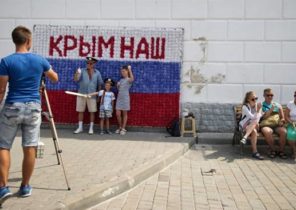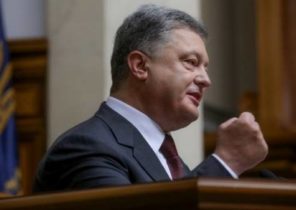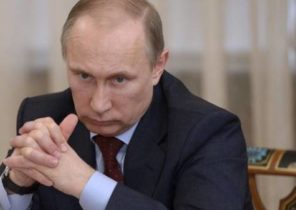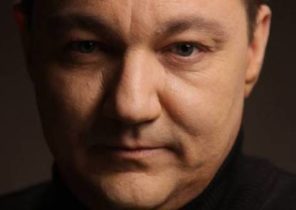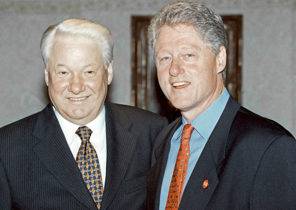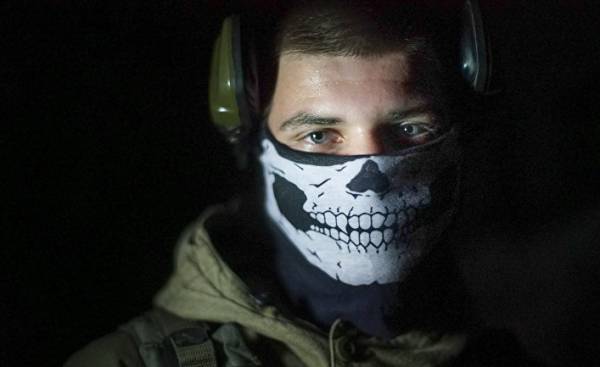
Expressen reporter Diamant salihu (Diamant Salihu) and Hilmarsson photographer Kristoffer (Christoffer Hjalmarsson) tell about events from the place of forgotten European war.
The first part of the report, second part, third part.
Avdeevka, 15 February night
It seems like crawl in a rat hole.
Downstairs, in the dark, we find Alexander Drill, 50 years old, who left his wife, children and grandchildren to go to the front in the East of Ukraine.
We sit down in the logs, steel plates and stacked on top of each other sacks of land lying along the walls. Green boxes with ammunition are on top of one another. Lying spent shell casings.
Just ahead in the earthen wall you can see the hole facing East.
“Spartacus. There are hidden separatists.”
Voice tired. Alexander Drill standing watch in a trench on the side controlled by the government. He gazes at the landscape. Open mined battlefield. On no man’s land, where there is still inhabited houses.
“We sometimes see civil”.
Every night both sides fired at each other with machine guns and Kalashnikovs, but a whole week in early February, there were fierce battles with heavy artillery.
“They were influenced by Russian propaganda”, — said Alexander Drill on enemy soldiers, many of whom were holders of Ukrainian passports who have applied against their former compatriots.
Left his wife and children because of the war
When three years ago there was a revolution on the Maidan, he and his countrymen built barricades. Street protests were the beginning of an incredible chain of events: President Viktor Yanukovych was dismissed. Russian troops annexed Crimea. The Eastern regions of Lugansk and Donetsk declared independence.
A passenger plane of Malaysian Airlines with 295 people aboard was shot down by a Russian missile over Eastern Ukraine from the territory under rebel control.
Alexander Drill was in the army of the Soviet Union, and then spent three years in the Ukrainian army before the country declared independence in December 1991. At that time he had had enough of military service.
“But when the war started, I was in the number of reservists”. He is survived by his wife, children and grandchildren, and again donned the green uniform. He thought that the service will be limited to a few months. But what he saw worried him.
“Young recruits did not know which side to take up arms,” he says.
Defense troops of Ukraine were at that time few in number and poorly armed. Arms for soldiers, which were sent to the front, barely enough. Relatives raised money to buy bulletproof vests for them.
One of the biggest armies in Europe
During the three-year war, the US and the EU helped to train Ukrainian troops. According to radio Free Europe, the Ukrainian army has grown from just over five to 250 thousand battle-ready soldiers. It makes aspiring to NATO Ukraine, owner of one of the largest armies in Europe.
Not necessarily that the soldiers are motivated to fight. Everyone with whom we speak, I want the killing ended by a political solution. At the same time, none of the soldiers from the Ukrainian side is not prepared to compromise, forbidding any territory. So the fighting continues at the front every night. The ceasefire, agreed to by the parties to the conflict seem to be a joke.
The soldiers mockingly talking about the European security organization OSCE, whose task is to monitor the truce. They describe the observers as blind, slow-moving hedgehogs, closing its eyes to all violations.
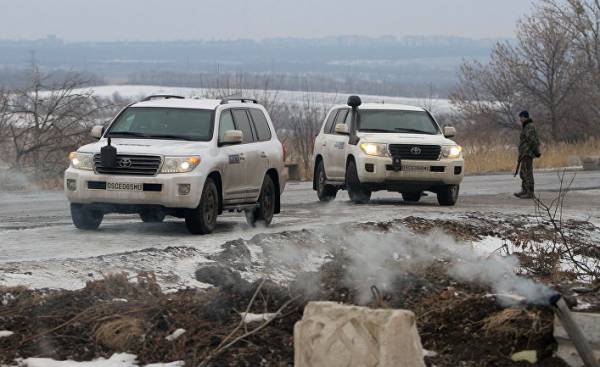 © AFP 2016, Anayolii Vocablulary OSCE in Luhansk region
© AFP 2016, Anayolii Vocablulary OSCE in Luhansk region
From the South blow the icy wind. We have to go back until after lunch again the shelling began.
We go to the trench depth on the belt, moving along the marked path, not to get on mine. We were told not to photograph the armored vehicle, which is parked in the garage with a concrete roof and a camouflage network on top.
Before the war, there was radar. Now it is hard to imagine. All of the buildings was bombed, and metal debris exploded and shot of military vehicles rusting in the snow on the background of barren landscape.
“Some are only 21”
Beyond the front line is a makeshift bunker with a caved in roof. It is used as headquarters. Outside, his guards brown dog, she sniffs our clean clothes. The bunker is close, oblong. At one of the walls opposite a wood-burning stove is a black leather sofa. The Ukrainian flag is seen in the back of the room. On the same wall, behind the sofa, hangs a large map of the area. Right attached a lot of children’s drawings Christmas greetings and angels.
The commander of that part of the front — Bogdan Garnag, 26 years old, from Kiev. He was a soldier even before the war broke out, but all my experience got on the battlefield.
“We have commanders and younger, some 21 years”.
Bogdan garnag is tired of war. It looks like you haven’t slept for weeks. He has no doubt, against whom he fights.
“We are fighting against the separatists, but in the first place — against regular Russian troops.”
He leaned on the table. Cigarette smoke eats the eyes. The room is quiet. Bogdan Garnag looked the enemy in the eye in August 2014 during one of the fierce battles for Ilovaisk, a suburb of Donetsk. Then killed more than a thousand soldiers and about a hundred civilians.
“We negotiated to go in there and pick up the wounded soldiers. Russian troops with whom we spoke, was from the Russian Caucasus”, — says Bogdan Garnag.
Russian troops have been there mostly in the fall of 2014 and spring of next year, according to multiple reports. The last time the young commander saw a Russian in Spartacus three months ago.
He saw firsthand their flags with shooting positions.
“Now they have gone from there. There is no doubt that it was a Russian, — he says. — No matter where they are, most importantly, they are not welcome here. They attack us. They are our enemies.”
From the bombed-out building stepped out cautiously Alexander Drill, carrying crates of ammunition. He’s preparing to spend another evening at the front.
Three Bibles lie untouched on the burned armored personnel carrier.
The wind ruffled the yellow-blue flag.
Donetsk, February 16, the middle of the day
According to the rest of the world and the Kiev government, they still live in Ukraine. Most people in the cities of Donetsk have another look at it. For people the self-proclaimed Donetsk people’s Republic, the war — itself a familiar part of everyday life.
Valentina Gerasimovna, 80 years old, crane operator retired, living in the Kiev area. This part of Donetsk suffered greatly from rocket attacks from the Ukrainian side
“Look yonder at that house,” Valentine says and points at the building where he lives. Visible heavy damage from rocket attacks.
She’s 60 years he lived in the same apartment, decorated with a large carpet on the walls. Her carpets.
Expressen: When the war is over?
Valentina Gerasimovna: I would also like to know when. Maybe when I’m in a cemetery.
The first Donetsk to once again become part of Ukraine?
— No. How can we unite if they shell us?
— What do you think the situation will affect what Donald trump became President of the United States?
I hope that events will change for the better around the world, and especially here. New government means new policies. Maybe we can help.
— How much money you need to live?
— My pension — 4 800 rubles (approximately 750 Swedish kronor — approx. ed) to a month. This is not enough, but what can you do? Sometimes I eat one bread with milk.
Galina Garbuziuk, 51, works at the thermal power plant in Donetsk
I work for a heating plant, which was recently bombed. We then could not work, and for those days I do not get paid.
As you impact the bombing?
— The last time awful. Our apartment was not heated, and because of the cold I prostudio ear.
— What will happen now that Donald trump became the President of the United States, I think it will affect the Ukrainian conflict?
— No idea. I do not often watch the news, we have no electricity.
Sergei, 60 years old, retired, Donetsk
— War affects everyone. We hear bombing every day. One of the bombs exploded in front of our house. I was bombarded with shards of glass.
— How do you think the conflict will affect what Donald trump became President of the United States?
Maybe you will feel better, because trump talks with Russia. And the DNR (Donetsk people’s Republic) talks with Russia.
— When the war is over?
— The war can last for decades. I’m afraid that it could escalate into a conflict like the Israeli-Palestinian.
Valentine Voronin, 26 years old, sons Roman, 7 years old, and Egor, 3 years. Working in a grocery store in Donetsk
— War affects the economy. Everything here is more expensive than in Ukraine, and harder to find a job.
— When do you think the war is over?
I don’t know, but I hope that in this year.
— Do you assume that will again become part of Ukraine?
— I’m ready to become a part of China, just to live with children without war. I’m tired of explosions.
— How do you think the conflict will affect what Donald trump was elected President of the United States?
— I and many here really hope that bombs will be smaller and the US will stop giving money to Ukraine.
— Have you personally suffered from the war?
— None of my family members was killed or injured, but many of my close friends — the soldiers of the Donetsk people’s Republic.
